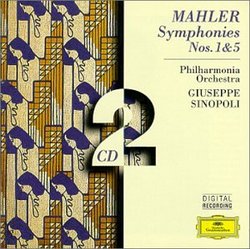| All Artists: Gustav Mahler, Giuseppe Sinopoli, Philharmonia Orchestra of London Title: Mahler: Symphonies Nos. 1 & 5 Members Wishing: 0 Total Copies: 0 Label: Dg Imports Release Date: 12/30/1999 Album Type: Original recording remastered, Import Genre: Classical Style: Symphonies Number of Discs: 2 SwapaCD Credits: 2 UPC: 028945947228 |
Search - Gustav Mahler, Giuseppe Sinopoli, Philharmonia Orchestra of London :: Mahler: Symphonies Nos. 1 & 5
 | Gustav Mahler, Giuseppe Sinopoli, Philharmonia Orchestra of London Mahler: Symphonies Nos. 1 & 5 Genre: Classical
|
Larger Image |
CD Details |
CD ReviewsOne of the best Fifth's ever Evan Wilson | Cambridge, MA | 08/23/2000 (5 out of 5 stars) "I'm not always taken with Maestro Sinopoli's approach to conducting, but in the case of Mahler's Fifth he gets everything exactly right (to my way of thinking anyway). Often, I find that Mahler meanders aimlessly and drags far too much for my taste. This is especially true in performances where the conductor feels obliged to underline how "profound" Mahler is being. (See the DG Bernstein recordings which I find truly awful in their indulgence. His earlier Columbia recordings of Mahler are much better.) Similarly, I quickly tire of the "slow=profound" approach of some others, which tend to be soporific.Sinipoli's performance brilliantly treads the line between these two approachs. He highlights elements without drawing untoward attention to them. He maintains a sense of pulse even in the slow sections, so one always feels one is GOING somewhere. Moreover, this is a performance which has a true sense of occasion. Both conductor and orchestra perform with white hot intensity and the sound is detailed, but warm. It's a performance that amazes me every time I listen to it. I bought the Mahler Fifth when it was on a single disc, so I cannot comment on Sinipoli's recording of the First. Still, even if it's an average performance, this set is worth the price of a single full-priced disc to get the Fifth. If Sinipoli brings to the First anywhere near the intensity he brings to the Fifth, then it's an incredible bargain." Sinopoli and Mahler arent' the best match Santa Fe Listener | Santa Fe, NM USA | 05/14/2007 (3 out of 5 stars) "Complete Mahler cycles from England are rare. Therefore his cycle made history in a minor way, and the British critics, despite their suspicion of him as an interloper on the London musical scene, were complimentary. But I find there's something off about most of the results, inluding the two symphonies collected here. for one thing, DG's digital sound is overly bright and often harsh in loud passages; there's no warmth or bloom, and at times detail becomes quite muddied. Second, the Philharmonia Orch. wasn't in the best shape in the Eighties, and one doesn't hear resplendent playing. Mahler really benefits from the highest possible level of polish and virtuosity (he was, after all, conductor of the Vienna Phil.) The Philharmonia sounds fairly crude at times.
In the end, however, the failings come down to Sinopoli himself. He had lots of ideas, but they mostly funciton from bar to bar. ONe misses an overall conception, and there's a lack of sympathy with Mahler's emotional world, not like the analytical chill of Boulez but insufficient humor, warmth, and emotional grandness. As to specifics, Sinopoli's tempos are all within the usual range in both works. His attacks are often too blunt, and he rarely soars with that breathtaking freedom that makes Mahler transcendent. Even at a bargain price I'm not sure this twofer yields much joy." |

 Track Listings (4) - Disc #1
Track Listings (4) - Disc #1